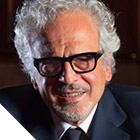REVOLUTIONS
Following “MOTI,” which was last year’s theme, the theme the 2025 edition of MITO SettembreMusica is “REVOLUTIONS,” which we’ve chosen to be interpreted in any number of ways – from aesthetic, spiritual and scientific perspectives. It marks a return to ground zero. Such a definition also suggests a radical shift in the established order, a break with entrenched listening habits and an opportunity to pry open new points of view. As in 2024, the program follows a two-lane path. While we promote and showcase the crème de la crème of the host cities’ own cultural expressions, we’ll also be engaging in dialogues with organizations beyond national borders, to build collaborative projects within a framework of European integration.
The Revolutions theme encapsulates four thematic areas, though their boundaries are often fluid and at times overlapping.
This approach reflects our desire to underscore the complexity and chaos the world seems to be caught up in today – not to confound audiences, but to expose concert-goers to stimuli, provocations, reflections and ideas in a way that eclipses refined entertainment and serves as food for thought. In short, we aim to keep pace with the times.
The four thematic areas are:
Mitya and the Others
A tribute marking the 50th anniversary of the death of Dmitri Shostakovich, also dedicated to fellow composers of his generation.
Berio and the Avant-Garde
A tribute to Luciano Berio to mark the 100th anniversary of his birth.
Revolutions
Times of War, Times of Peace
Listening with the Eyes
MITO 2025’s multidisciplinary approach is especially evident in this thematic area, which includes:
– Nomadic. Song for Biodiversity, by and with Telmo Pievani, philosopher of science, and Gianni Maroccolo. It’s a narrative of eternal migrations conveyed through stories, visual suggestions, poetry and, of course, music, that raises questions and evokes emotions, in which migration is viewed as a source of life and diversity, a yearning for survival;
– The book of women by Riccardo Nova, closely tied to non-European musical sensibilities, blend traditional Indian chants with mystical Western traditions;
– Without Blood There Is No Cause. Here, music, video and words come together to present the multifaceted figure of Julius Eastman. Structured as a secular oratorio, this show celebrates the African American musician, singer and composer whose contribution to avant-garde music is explored through a biographical program.
This year’s edition of MITO SettembreMusica serves up more events than the 2024 edition, and, as always, the program invites fans to forge their own path through the festival’s thematic offerings.
MITO 2025 is all this and more when it comes to repertoire and innovation. Indeed, both are marked by genius and a certain degree of unruliness.

Giorgio Battistelli
Direttore artistico








